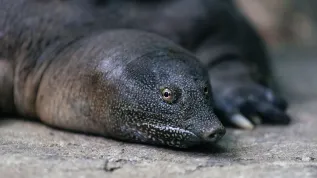
Scientists from Olsztyn are are working on hypoallergenic dog food based on mealworm. Initial acceptance tests have shown that rats and dogs like it, researchers say. Preclinical trials begin in February.
The leader of the project 'Development of an insect protein food for companion animals with food-responsive enteropathies' financed in the LIDER XII competition organized by the National Centre for Research and Development is Remigiusz Gałęcki. His team from the University of Warmia and Mazury in Olsztyn and the Lodz University of Technology has just completed the first stage of the three-year application project carried out at the Department of Veterinary Prevention and Feed Hygiene, University of Warmia and Mazury in Olsztyn.
HEALTHY DOGS TEST THE TASTE BEFORE SICK DOGS GET THE FOOD
Gałęcki said: “We have developed a hypoallergenic formula for everyday use in dogs with clinical signs of food-responsive enteropathies. Laboratory tests have confirmed that it is safe to use, and initial acceptance tests have shown that it tastes good to rats and dogs. We are now testing our innovation. The next stages of the project are aimed at determining the added value of the food by confirming its usefulness in veterinary medicine.”
Ultimately, scientists intend to create food for dogs with allergies. Food intolerance and food-responsive enteropathies are a growing problem. 33 percent of dogs are allergic to at least one ingredient present in food. And it's not just a problem for purebred dog owners.
Remigiusz Gałęcki suggests that mealworm protein may have a more beneficial effect on the health of dogs than such ingredients as hydrolysed animal protein. He also points out that insect protein is a low-processed ingredient. The team's research will show whether the insect protein will have an effect on the immune system.
MEALWORM IN FOOD
Further research will include diagnostic analyses that will allow scientists to assess the impact of the food on veterinary patients with food-responsive enteropathies.
Gałęcki said: “We will check whether the condition of the animals improves and whether the use of the food reduces the symptoms of food-responsive enteropathy. These symptoms include skin changes, itching, otitis externa, overloaded perianal glands, periodic diarrhoea.”
After eight months of research, his team created five different formulas for pet food. They contain mealworm powder in various proportions. The foods have been tested on rats. The animals accepted it and felt good after eating it. Researchers can guarantee that it can be safely used in companion animal nutrition.
Preliminary acceptance tests were also carried out.
Gałęcki said: “We gave our food to 31 dogs and received information from the owners that as many as 29 animals accepted the mealworm-based food. These included both clinically healthy animals and dogs that had food-responsive enteropathies. It is very important for us that, in addition to the beneficial effect on the animals' health, this food should simply taste good.”
COMPOSITION CONSISTENT WITH EVIDENCE-BASED MEDICINE
Further tests will be preclinical studies. The team consists of veterinarians, zootechnicians, a gastroenterologist, an economist and a microbiologist. They will conduct numerous tests, from the simplest blood analyses to microbiome tests and histological examination of tissues of laboratory animals.
Using rats again is necessary for scientists to ensure that insect feed is the right choice for owners of sick animals. The next stage of research will begin in February. Rats will be tested for microbiota, blood morphology and biochemistry, immunological tests will also be performed.
At the Obihiro University of Agriculture and Veterinary Medicine in Japan Gałęcki investigates checks how mealworm powder affects pathogenic microorganisms that attack animals. This research is based on in vitro methodology.
NOTHING WILL BE WASTED
Gałęcki said: “Agricultural and food industry by-products are used in mealworm farming. This allows us to obtain a high-quality product (insect protein - a component in our food) from low-quality substrates. Thanks to this, we can have a positive impact on the environment.”
He added that the new food will be a fully domestic product, because all its ingredients come from Poland.
Gałęcki's team already has five patent applications. In addition to the main idea, which is a hypoallergenic food for dogs with food-responsive enteropathies, researchers are developing a whole range of insect-based products that can be used in veterinary medicine. This includes a mealworm oil and an ointment based on this oil.
He said: “We get maximum use of our substrates, and we will also use all the products of mealworm farming. It will be mainly fat and chitin. The ointment would be very useful, for example, in winter, because it is an ideal protection for our animals' paws exposed to salt and low temperatures Thanks to this ointment, paw pads will be well protected, we can also use it on irritated skin and abrasions.”
He added that mealworm-based oil improves the functioning of the skin's lipid barrier and has a beneficial effect on the neurological and immune systems.
MARKET-READY
The scientists assume that the license will be sold by the university. In their opinion, experienced pet food, veterinary supplements and drugs market players will be able to use the market potential of these innovations better than the researchers themselves.
The product will be extensively clinically tested before its market launch. This guarantees its quality and properties.
The project assumptions were presented at scientific conferences in Canada, Portugal, Germany and Japan. On June 14-15, 2023, a scientific conference on the use of insects for food and feed purposes will be held at the University of Warmia and Mazury in Olsztyn.
PAP - Science in Poland, Karolina Duszczyk
tr. RL
kol/ agt/ kap/













